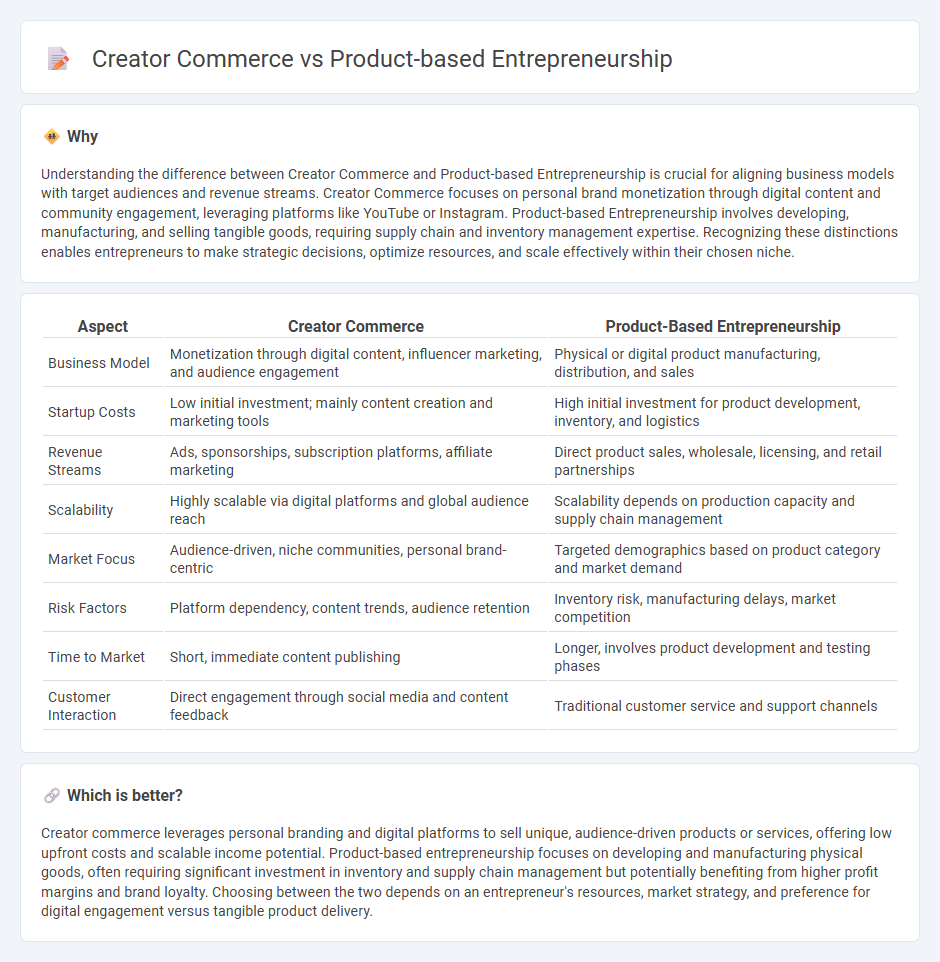
Creator commerce leverages digital platforms for content-driven sales, enabling entrepreneurs to build personal brands and engage niche audiences directly. Product-based entrepreneurship focuses on designing, manufacturing, and distributing physical goods, emphasizing supply chain management and inventory control. Explore the unique advantages and challenges of each to determine the best fit for your entrepreneurial journey.
Why it is important
Understanding the difference between Creator Commerce and Product-based Entrepreneurship is crucial for aligning business models with target audiences and revenue streams. Creator Commerce focuses on personal brand monetization through digital content and community engagement, leveraging platforms like YouTube or Instagram. Product-based Entrepreneurship involves developing, manufacturing, and selling tangible goods, requiring supply chain and inventory management expertise. Recognizing these distinctions enables entrepreneurs to make strategic decisions, optimize resources, and scale effectively within their chosen niche.
Comparison Table
| Aspect | Creator Commerce | Product-Based Entrepreneurship |
|---|---|---|
| Business Model | Monetization through digital content, influencer marketing, and audience engagement | Physical or digital product manufacturing, distribution, and sales |
| Startup Costs | Low initial investment; mainly content creation and marketing tools | High initial investment for product development, inventory, and logistics |
| Revenue Streams | Ads, sponsorships, subscription platforms, affiliate marketing | Direct product sales, wholesale, licensing, and retail partnerships |
| Scalability | Highly scalable via digital platforms and global audience reach | Scalability depends on production capacity and supply chain management |
| Market Focus | Audience-driven, niche communities, personal brand-centric | Targeted demographics based on product category and market demand |
| Risk Factors | Platform dependency, content trends, audience retention | Inventory risk, manufacturing delays, market competition |
| Time to Market | Short, immediate content publishing | Longer, involves product development and testing phases |
| Customer Interaction | Direct engagement through social media and content feedback | Traditional customer service and support channels |
Which is better?
Creator commerce leverages personal branding and digital platforms to sell unique, audience-driven products or services, offering low upfront costs and scalable income potential. Product-based entrepreneurship focuses on developing and manufacturing physical goods, often requiring significant investment in inventory and supply chain management but potentially benefiting from higher profit margins and brand loyalty. Choosing between the two depends on an entrepreneur's resources, market strategy, and preference for digital engagement versus tangible product delivery.
Connection
Creator commerce and product-based entrepreneurship intersect as creators leverage their personal brand and audience to develop and market unique physical or digital products. This synergy allows entrepreneurs to transform content creation into scalable product sales, enhancing customer loyalty and revenue streams. By integrating creative influence with product innovation, businesses tap into niche markets and personalize consumer experiences effectively.
Key Terms
Inventory Management
Product-based entrepreneurship requires precise inventory management to balance stock levels and meet customer demands efficiently, minimizing risks of overstock or stockouts. Creator commerce relies more on agile inventory strategies, often producing on-demand or limited runs to align with audience engagement and trends. Explore effective inventory management techniques tailored for each model to enhance operational success.
Content Monetization
Product-based entrepreneurship centers on selling physical or digital goods, leveraging e-commerce platforms and supply chain management to drive revenue, whereas creator commerce emphasizes monetizing content through direct audience engagement using social media, subscriptions, and brand collaborations. Content monetization in creator commerce relies heavily on building a loyal community and diversifying income streams via ads, merchandise, and exclusive content offerings. Explore innovative strategies to optimize content monetization and elevate your creative business model.
Supply Chain
Product-based entrepreneurship centers on managing inventory, supplier relationships, and distribution channels to ensure efficient supply chain operations. Creator commerce emphasizes direct-to-consumer models, often leveraging digital platforms for seamless order fulfillment and personalized customer experiences. Explore how these supply chain approaches impact scalability and innovation in modern business models.
Source and External Links
What is a product-based business? - A product-based business solves client problems through products built on accumulated expertise and knowledge, allowing entrepreneurs to move beyond traditional client assignments to scalable offerings like guides, tools, and online courses.
Understanding a Product-Based Business Model - The product-based business model involves iterative stages including designing, making, pricing, selling, delivering, and continually improving a product to ensure value and market success.
Product-Based vs. Service-Based Businesses: Pros, Cons, & Differences - A product-based business sells tangible goods, making it easier for customers to assess value before purchase but requiring careful inventory and demand management, unlike service businesses that sell intangible expertise.
 dowidth.com
dowidth.com